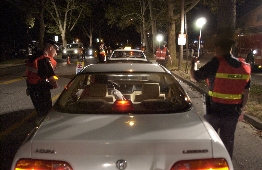In Pennsylvania, Implied Consent means that you agree to submit to a chemical test if you are ever asked to do so by a police officer. When you go to renew your driving license, it is one of the forms you will have to sign.
It is known by a couple of different names: the DL-26 form, the O’Connell Warnings and the Implied Consent warnings.
The police are required to read this to you when they ask you to submit to a breath or blood test. Why? Because a refusal to submit to a DUI test carries with it, upon satisfactory proof, at least a 12 month license suspension, just for the act of refusing. Under certain circumstances, the loss of license can be as much as 18 months. This is "free and clear" of the outcome of the criminal case. In other words, you can get a not guilty from the criminal prosecution, but the license loss due to a refusal will be left unaffected. If that same person who was adjudged to be a refusal is found guilty of a DUI on the criminal side, they face another subsequent 12-18 month suspension plus mandatory jail time. Even if you would have been charged at a lower tier because your BAC was not in excess of 0.16, a refusal is charged at the highest tier possible.
However, despite these severe consequences, Pennsylvania doesn’t care if you understand the waiver that the officer is reading:
Court ruling causes DUI dilemma
Should police be required to explain alcohol test in language of suspect?
A New Jersey Supreme Court decision overturning a drunken driving case because the driver did not speak English could affect Pennsylvania motorists and police.
 This article shows some of the evident hypocrisy in Pennsylvania DUI law. On one hand, the officer is required to read the waiver to you to make sure you understand the consequences. On the other hand, they don’t have to make it available in Spanish even in areas where there is a majority Latino population?! So what do the Pennsylvania Courts have to say about this?
This article shows some of the evident hypocrisy in Pennsylvania DUI law. On one hand, the officer is required to read the waiver to you to make sure you understand the consequences. On the other hand, they don’t have to make it available in Spanish even in areas where there is a majority Latino population?! So what do the Pennsylvania Courts have to say about this?
An appellate case was argued over this very apparent discrepancy. The law in Pennsylvania is hypocritical. The law requires proof that the person who refused made a knowing, intelligent and voluntary decision to refuse; yet, the law has no requirement that the listener be provided the chemical warnings in his/her own native language. In other words, Pennsylvania Courts have de facto held that the English language is the lawful official language in Pennsylvania. Those who do not speak it are held liable for not knowing the de facto official language, the English language. The court ruled that, under implied consent, anything short of submitting to testing is deemed a refusal. The Pennsylvania Supreme Court even refused to hear the appeal.
This holding flies in the face of Pennsylvania history. In 1837, the Pennsylvania legislature passed a law which required schools to provide instruction in different languages, establishing the first ever bilingual education law.
This lunacy is exclusively reserved for DUI and driver’s licensing cases. For example, if English only speaking police officers came to a house that had Spanish only speaking residents and asked in English if the residents would consent to a warrantless search of the house their search, any such consent would be totally invalid. If the police and prosecutors tried to argue that the consent was valid, they would be laughed out of court.
Remarkably, it seems as if appellate courts forget that a chemical test of one’s breath or blood is a search. But, it’s not just any search. It’s a search of one’s body. It’s an invasion of one’s bodily integrity by the government.
Isn’t it amazing how a house or a car gets more protection than our bodies?
Is it really that difficult to keep a copy of the waiver in Spanish? For a long time, AT&T has kept a special line that was available 24/7 free for police agencies to facilitate translating a wide range of languages. There may be a number of people who do not understand English well enough to comprehend the severe consequences they may face. But one DA and the state don’t really care:
But, [the DA] warned, voluntarily agreeing to provide Spanish-speaking interpreters for DUI arrests could become a slippery slope.
"What’s next, bilingual signage on our highways?" he asked.
I find that to be an utterly ridiculous and callous statement. It is at the very least ethnocentric. At the most it’s racist. The whole reason that road and safety signs have shifted to symbols instead of text is so that people of all languages and educational levels can understand them. In fact, it makes our roads safer.
Furthermore, the language used in the Implied-consent Warnings is remarkably complex even for native English speaking non-lawyers to understand. This is the exact language that is supposed to be read is:
1. Please be advised that you are under arrest for driving under the influence of alcohol or controlled substance in violation of Section 3802 of the Vehicle Code.
2. I am requesting that you submit to a chemical test of (blood, breath or urine. Officer chooses the chemical test). [N.B., urine is inadmissible in Pennsylvania]
3. It is my duty as a police officer to inform you that if you refuse to submit to the chemical test, your operating privilege will be suspended for at least 12 months, and up to 18 months, if you have prior refusals or have been previously sentenced for driving under the influence. In addition, if you refuse to submit to the chemical test, and you are convicted of or plead to violating Section 3802(a)(1) (relating to impaired driving) of the Vehicle Code, because of your refusal, you will be subject to more severe penalties set forth in Section 3804(c) (relating to penalties) of the Vehicle Code, the same as if you would be convicted of driving with the highest rate of alcohol, which include a minimum of 72 consecutive hours in jail and a minimum fine of $1,000.00, up to a maximum of five years in jail and a maximum fine of $10,000.
4. It is also my duty as a police officer to inform you that you have no right to speak with an attorney or anyone else before deciding whether to submit to testing and any request to speak with an attorney or anyone else after being provided these warnings or remaining silent when asked to submit to chemical testing will constitute a refusal, resulting in the suspension of your operating privilege and other enhanced criminal
sanctions if you are convicted of violating Section 3802(a) of the Vehicle Code.
3802 and 3804(c)??!!??? Say what?
So remember friends if even you don’t understand what the officer is saying, it doesn’t matter. It counts as a refusal. So sad. At the McShane Firm, LLC we are litigating this issue anew to try to get common sense, fair and non-ethnocentric rulings that reflects our society and not xenophobia.
-Justin J. McShane, Esquire, Pennsylvania DUI Attorney
I am the highest rated DUI Attorney in PA as Rated by Avvo.com
You can follow me on Twitter, Facebook or Linkedin

Board Certified Criminal Trial Advocate
By the National Board of Trial Advocacy
A Pennsylvania Supreme Court Approved Agency
Landon Ascheman says:
Excellent issue, there are many drivers that can follow road signs but do not speak the language clearly.
I think one of the points that raises even more alarms for me is point 4. Asking for an attorney appears to essentially constitute a test refusal?!?
Bill Bly says:
The law on implied consent in Maine is nearly identical to PA with respect to our courts dispensing with the necessity of reading IC in the driver’s native language. In Maine, we have very diverse pockets of people in Portland and Lewiston/Auburn. Many of our citizens come from Somalia and Vietnam. In spite of the influx of a foreign language speaking populace, the courts have yet to get with the times. I admire the sensible step that the NJ Supreme Court took and can only hope that states like PA and ME get with the times.
Trace R. Bullit says:
The fact that Number 4 might be confusing to a lot of people (no right to speak with an attorney…) is actually a clever legal devise. A lot of the people who hear this are confused to say the least “What do you mean I cant have an attorney? Aren’t I constitutionally gaurenteed one?!” You might hear once or twice. The fact is, you did not request an attorney when signing the Implied Consent form at the DMV, right? the point is, YOU have to make the decision to do the test. Besides, any attorney in PA would advise you to submit to the test, and the reason becomes clear: you have NO RIGHT to refuse the test. If you had a RIGHT to refuse the test, you would not be sanctioned for it. There would be no penalty. It’d be like you had to go to jail for 5 days if you voted or didn’t vote in the last election. As far as the language barrier goes, I fully support making the implied consent translateable into languages. Provide the police with recordings of native speakers accurately translating the DL26 in various dialects and languages. I can even imagine a little button on an iPad that says “Do you understand” in english that the officer presses and the recording asks the subject if they understand in their native tounge. Maybe there is a million dollar idea there… Hmmm